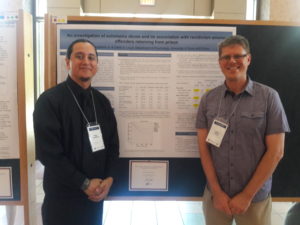Our recent research activities, news, accomplishments, and publications
Click here for an overview of our areas of research.
December 2016
Our paper, Does intra-individual change predict offender recidivism? Searching for the Holy Grail in assessing offender change was recognized by the journal Aggression and Violent Behavior as one of its 5 most highly cited papers
November 2016
Doctoral student Cole Higley proposed his Master’s Thesis titled: “The risk principle paradox: A multilevel approach to examine which high-risk offenders successfully change during rehabilitation programs”
September 2016
Doctoral student Ariel Stone presented her research to the department colloquium, in a presentation titled: “Using dynamic risk to predict recidivism for violent offenders”
August 2016
Congratulations to undergraduate student Felipe Candelaria, who presented his research poster at UTEP’s Campus Office of Undergraduate Research Initiatives’ (COURI) summer research symposium!

May 2016
Partnered with Colorado Department of Corrections to submit proposal to Bureau of Justice Assistance (BJA) to investigate and evaluate a Smart Reentry program.
April 2016
Doctoral student Cole Higley presented his research to the department colloquium, in a presentation titled: “What makes an effective agent of change? Correctional volunteers’ perceptions of training programs describing evidence-based risk and strength approaches”
January 2016
Subcontract awarded to the PO3C Lab through UTEP’s Center for Law and Human Behavior for analysis of data from San Jose Police Department, including research assistant position for doctoral student, Ariel Stone
November 2015
New article in press: Serin, R. C. , Gobeil, R., Lloyd, C. D., Chadwick, N., Wardrop, K., & Hanby, L. Using dynamic risk to enhance conditional release decisions and outcomes. Behavioral Sciences and the Law.
January 2015
Grant awarded from National Institute of Justice: Research on offender decision-making and desistance from crime: A multi-theory assessment of offender cognition change.